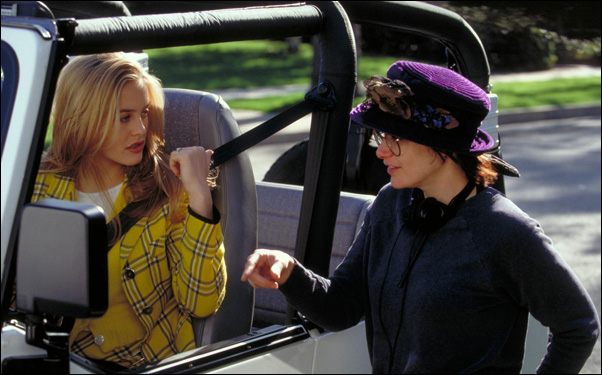“When you’re casting kids, it’s like a river,” said Amy Heckerling between a double bill of “Clueless” and “Fast Times at Ridgemont High.” “Every time you stick your foot in it, it’s a different river. Different people are out there at different times and that happened to be an awesome time.”
That awesome time Heckerling was referring to happened in 1982 when she culled together a cast including future Oscar winners Sean Penn and Forest Whitaker for the 1982 comedy “Fast Times.” But it could’ve covered nearly any instance when the writer/director has dipped her toe into the water, which as Saturday night at the Aero Theater in Santa Monica reminded is still an all-too rare occurrence.
During the Q & A, Heckerling spoke a little about her upcoming bloodsucker comedy “Vamps,” promising to the crowd that “Clueless” star Alicia Silverstone is “very adorable” in their second film together, but spent the majority of the evening reminiscing about her two high school-set classics and discussing why female filmmakers in general don’t work more. Or at least that’s what the evening’s moderator Variety editor Steve Gaydos honed in on to an exasperated Heckerling.
“I try to not think about being a woman,” said Heckerling. “That works for me because I might get into the whole wah wah thing. But the numbers [regarding female filmmakers] are terrible. They’ve always been terrible. They still are. “
In fact, Heckerling didn’t even know there was such a thing as a filmmaker growing up in Brooklyn, where “as soon as I had a bus pass, I was off to the city to see whatever I could see.” She related that it wasn’t until a classmate in high school who “used to copy off of me” said he was going to make movies that she decided, “Fuck him! I love movies. I want to make them. And if this idiot could do it…”
While she was able to leave that dim bulb behind, there were many more awaiting in Hollywood and in a place known for credit-grabbing, Heckerling was glad to give them credit for helping birth “Clueless,” her reworking of Jane Austen’s “Emma” set in a blasé Beverly Hills. With the first question from the crowd, a young woman in the audience gushed that she wrote a letter to Heckerling in high school and “largely based my personality on Cher [Silverstone’s flighty queen bee who finds purpose],” a confession that the director rewarded with a story about how she came up with the film.
Actually I was in my mother’s office one day and I was reading “Gentlemen Prefer Blondes.” And I loved the concept that wait a minute, if you’re writing a book, you don’t have to be a genius. You can have a stupid person having a point of view and writing all their feelings. That’s a very liberating feeling. What’s important is what you have to say and then pick the voice to say it, but we’re not all meant to sound like Herman Melville.
I loved that here’s this sort of crazy, happy, happy girl telling us how to do things and that wasn’t what “Clueless” was, but that stuck with me. Then I wrote a script that was based on a French movie and it was about behaviorism and then I had characters acting out the same experiments as rats and they said, “Oh, this is too smart.” So I said, “alright, I’ll show you dumb.” [laughs]
Other revelations of the evening included Heckerling’s explanation of why the high school in “Clueless” was named after Louisa May Alcott’s father Bronson Alcott (“one of the first big feminists who thought women should get an education…and then I started going out with this guy Bronson Pinchot, so he was named after Bronson Alcott, so I thought oh, it’s beshert, which is Yiddish for it’s supposed to be, but really, you shouldn’t go on the basis of that kind of stuff”), a confirmation for Gaydos’ edification that she once directed famously volatile producer Joel Silver in a musical student film (“It was like some students trying to save NYU because it’s going bankrupt in the Andy Hardy [tradition], then I put in a different voice for the singing — he’s still not talking to me”), and an admission that despite a lack of deleted scenes on the “Fast Times” DVD, she unearthed and offered to the studio the full sex scene that she intended for “Fast Times” — where there was more gender equality in the nudity – on a video in her garage, but she didn’t have any takers.
Even if speaking about female equality in film in general seemed to hold limited interest to her now as a discussion point, the line of questioning did give way to one of the resounding truths of the evening when Gaydos asked “how many Amy Heckerlings were there when you got started?” “One,” she replied before offering “There were some other women directors, though.”
As nice as it would be for the second part of that statement to change, it’s great to know the first part hasn’t.




